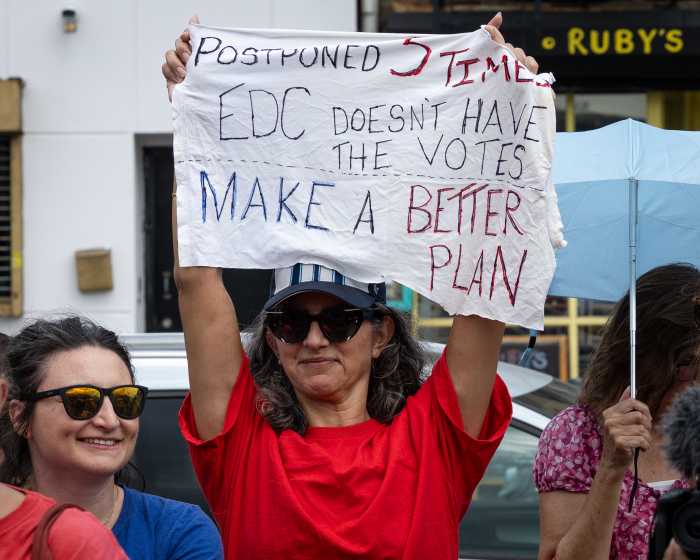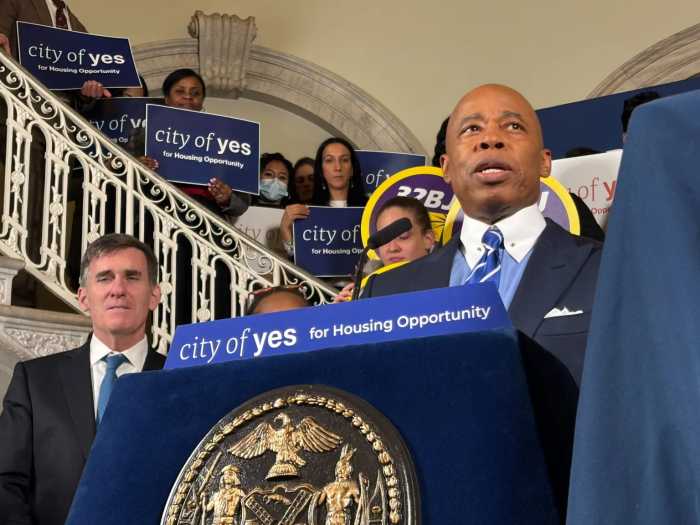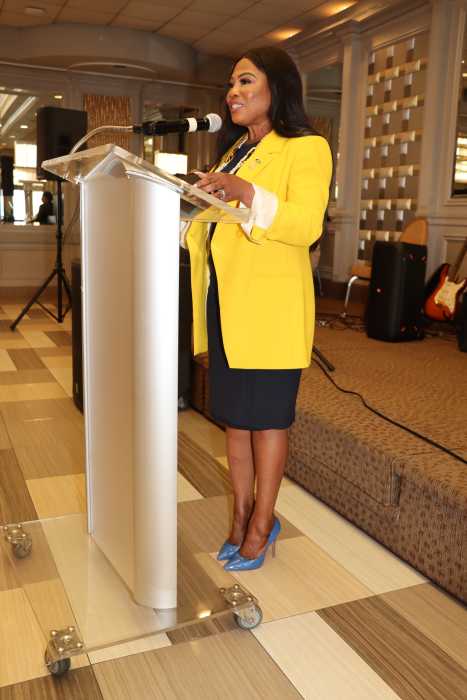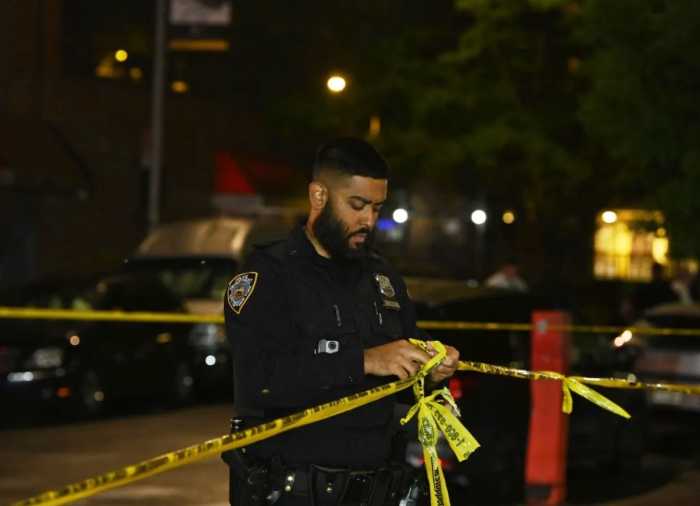BY PAUL SCHINDLER | Faced with a boisterous picket line that drew a crowd of more than 50 and with the absence of every lesbian, gay, and bisexual elected official from New York City — indeed, every other prominent city Democrat as well — Joe Solmonese, president of the Human Rights Campaign, used his keynote address at the group's annual Midtown Manhattan dinner to answer critics who fault it for going along with a version of the federal Employment Non-Discrimination Act (ENDA) that does not include protections for transgendered Americans.
The non-inclusive version of ENDA passed the House of Representatives last November 7 and awaits action in the Senate. President George W. Bush has sent strong signals he would veto the measure if it reaches his desk.
Saturday night at its annual Manhattan dinner, the Human Rights Campaign was faced with a boisterous picket line.
“I understand and I hear every day that some members of our community are feeling forgotten or left behind. It is easy to understand why,” Solmonese told a crowd approaching 1,000 in the ballroom of the Hilton on February 23. But he also said, “We have to overlook our differences and we have got to see instead of our individual wants and immediate desires — a vision for the America that we all want to live in.”
As originally introduced after the 2006 elections, ENDA included protections based on gender identity and expression as well as sexual orientation, but in late September out gay Democrat Barney Frank of Massachusetts, one of the bill's key sponsors, announced that it would not clear the House with the transgender protections. Even as more than 300 LGBT groups nationwide demanded that the measure be pulled or defeated if there was no gender identity language, HRC at first said it neither supported nor opposed the revised bill and then on the eve of the floor vote urged House members to vote for it.
In his toughest volley against some in the LGBT community who argue that HRC has lost its right to lead the battle on ENDA, Solmonese suggested it is others who have left the field.
” When did we say to ourselves, okay that civil rights thing, I'll give it a year, maybe two, then I'm done,” he said. “Let me be very clear: No, we are not done. We are in the grueling, blinding middle of this fight and the middle of this fight is the hardest part.”
Having stated HRC's commitment to delivering protections in the workplace and against hate crimes — as well as marriage rights — for all members of the LGBT community, Solmonese said, “Some of us may want to stand back or check out, but there is no standing back. There is no checking out. Because sometimes — and I know this is frustrating — the fight for our rights feels like hell, but as Winston Churchill so aptly put it, 'When you are going through hell the most important thing is to keep going.'”
As guests arrived at the Hilton, a colorful gathering of protesters, many carrying large pink placards in the shape of a hand giving HRC the finger, and backed by a spirited drum corps, stood on Sixth Avenue denouncing the group's posture on ENDA.
“Time and time and time again, HRC ignores the community and ignores the wishes of local community groups,” said Allen Roskoff, a key organizer of the boycott and president of the Jim Owles Liberal Democratic Club. Roskoff explained that his club is demanding more that just the restoration of gender identity language in the federal nondiscrimination bill.
“Jim Owles is asking members of Congress not to support ENDA in any form,” he said. “We should revert to the effort originated by Bella Abzug and Ed Koch to amend the 1964 Civil Rights Act to include protections for sexual orientation and gender identity and expression.”
Abzug and Koch, as Manhattan representatives in Congress in the early 1970s, introduced the 1964 Act amendment as a way to give gays and lesbians nondiscrimination protection in housing, credit, and public accommodations, in addition to employment. Years later, HRC and Frank originated the more limited ENDA approach to getting anti-bias legislation through Congress.
Roskoff pointed out that Bill Bradley, in his 2000 challenge to Al Gore for the Democratic presidential nomination, suggested amending the Civil Rights Act, rather than adopting ENDA, “but was shot down by Barney Frank and HRC.”
Not all the protesters on hand agreed with Roskoff's strategy for broadening the ENDA effort to include protections for more than just employment. Asked about the possibility of amending the 1964 bill, Dan Tietz, a former president of the Brooklyn Independent Democrats, an LGBT political club, said, “We would love that, but not today. If you can't get a trans-inclusive bill passed, there would probably be only five supporters in the House for amending the Civil Rights Act.”
Roskoff said his club will send a formal letter to all New York Democratic representatives this week to urge a rethinking on ENDA.
Jim Owles and Lambda protesters were joined by members of the Stonewall Democratic Club of New York City.
Some protesters focused on more than simply the strategic issues involved in enacting nondiscrimination legislation. The Radical Homosexual Agenda, which provided the drum corps as well as many of the bodies for the picket line, distributed flyers criticizing the corporate policies of several major HRC corporate sponsors. The flier argued, “HRC isn't just derailing the needs of the majority of the queer community. They're also narrowing our vision of what queer relationships can be.”
The crowd repeatedly returned to the chant,”What do we want? Liberation. Fuck that assimilation.”
Jessica Rechschaffer told Gay City News that she and another member of the Radical Homosexual Agenda threw anti-HRC leaflets at the dinner crowd and began to unfurl a banner during Solmonese's speech, but were hustled out by security. The disruption was not apparent to this reporter at the back of the banquet hall.
One elected official who joined the protest was Queens City Councilman Hiram Monterrate, there at the invitation of the Jim Owles Club. Roskoff lauded the many other elected officials who, he said, “took a big step” in boycotting a dinner they typically attend.
In fact, of numerous elected officials who in past years attended but were not there this time, only Micah Kellner, an openly bisexual East Side Democratic assemblyman, attributed his absence to the boycott. Others insisted, on the record, that they had scheduling conflicts, though Kellner's statement to Gay City News and off-the-record comments by staff members of several elected officials, pointed to a conscious effort to avoid the HRC event.
Kellner was among those that dinner officials from the stage announced as being on hand, but when reached by telephone the assemblyman said, “I was not there. I boycotted like everyone else. And I was really quite annoyed that they put my name on their press release. I phoned them late yesterday to make clear I was not coming.”
Christine Quinn, the out lesbian speaker of the City Council who addressed the HRC dinner in past years, attributed her absence to “scheduling conflicts.” In an email statement to Gay City News, a spokesperson for Quinn added, “However, the speaker has also made clear that she was very disappointed that the action taken by Congress with the Employment Non-Discrimination Act did not include gender identity. Moreover, the speaker is stunned that the Human Rights Campaign is penalizing those congressmembers who support a pro-LGBT agenda, and who voted against the Act because it didn't include transgenders. The speaker applauds her colleagues from New York — Congressmembers Clarke, Nadler, Towns, Velazquez, and Weiner — for their stand.”
Quinn's lesbian colleague on the Council, Lower East Side Democrat Rosie Mendez was also absent, as were out gay and lesbian Democratic legislators Senator Tom Duane of Chelsea, and Assemblymembers Deborah Glick of the Village and Matt Titone of Staten Island.
As late as February 22, HRC had gay Upper West Side Democrat Daniel O'Donnell, who steered the marriage equality bill to passage in the Assembly last summer, slated on their program to present the group's community service award to Marriage Equality New York, but that same day O'Donnell's office told Gay City News that he too had a scheduling conflict.
At a dinner which has been addressed in past years by Senator Schumer, among many, there was only one member of Congress on hand — upstate Democrat John Hall.
Several Democratic officials from Long Island, upstate, New Jersey, and Connecticut did attend the dinner, and the job of presenting Marriage Equality's award fell to Jason Bartlett, a freshman Democratic state representative in Connecticut who came out publicly just four days before the dinner.
A press release from Marriage Equality New York (MENY) about its award noted that “HRC's stance on ENDA is clearly not in line with our inclusive mission and disappoints those who believe we cannot leave anyone behind” and that the group “has ALWAYS been trans-inclusive and has always stood on the right side of this civil rights fight.”
In accepting the award, the group's deputy executive director, Ron Zacchi, said, “MENY feels for our transgender brothers and sisters protesting outside, as we have often been the people protesting outside because incremental changes were accepted on our road to marriage equality… HRC has chosen to honor our organization and our mission statement emphasizes inclusion, as inclusion can only strengthen our movement.


































